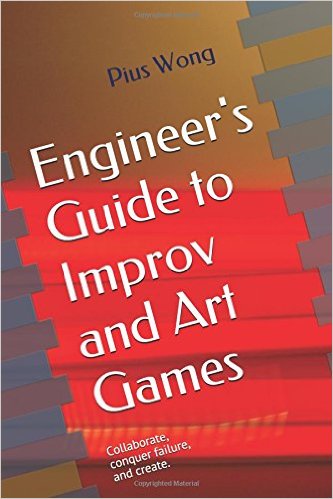Improv-Based Professional Development
-- Updated December 2017
As an offshoot of my consultancy Pios Labs, I'm starting to offer in-person training workshops in engineering concepts mixed with improv exercises. If you're interested in these workshops, learn more at the Pios Labs website.
References:
- Engineer's Guide to Improv and Art Games (also see below)
Better Design and Problem-Solving with Improv

-- Updated April 2017
Thanks to a really fun SXSW workshop that my colleague Rachel and I ran back in March, I'm ready to explore more. First of all, I wrote and released a reference book called Engineer's Guide to Improv and Art Games, which STEM profesionals or educators can use to learn about some design methodologies and the games or exercises that can help you practice them. That book was a great exercise in summarizing everything I'd been thinking about in this area up to that point.
Second, I'm now really investigating running in-person professional development workshops for engineers and educators locally in Austin and maybe around Texas. There's definite interest in improv for STEM locally that I didn't see even a year ago, and with the right partners it could work out. If you're interested, please let me know, or sign up for my mailing list on the topic for my studio Pios Labs.
One of the art games that we played at the SXSW workshop was something called "Exquisite Corpses," which my brother and a former coworker both separately showed me years ago. The variation we played had small teams gather around their tables to collaboratively generate series of alternating drawings and text captions, back and forth. It was a game to have people (1) overcome any self-consciousness or anxieties about their sketching abilities, (2) try generating both visual and verbal ideas under some time pressure, (3) play well with a team, and (4) have fun. I've been playing this for years, with friends, in a bar with classmates, and at work when needing to refresh brains, and it always results in hilarity. I started a running archive of these things on Imgur, and a preview of it is linked here and below, too.
References:
- More information about my book, Engineer's Guide to Improv and Art Games, published by my independent studio Pios Labs
- Running archive of "exquisite corpse" games on Imgur
- Preview of archive on my project page
Pilot Workshop
-- Updated January 2017
I'm excited that my colleague Rachel and I are running a long workshop on this topic at the 2017 South by Southwest Interactive conference. I've been thinking about a course like this for a while now, and I finally get to implement a small two-hour version of it with engineering and design professionals during SXSW Interactive. I've actually designed a 9-hour curriculum for an "Improv for Engineers" class, but I need to see how this first run goes.
If you're at SXSW this year, sign up for the workshop beforehand officially with SXSW (and not just in the Facebook event below), because space is limited, and get ready both to play and to think.
References:

Improv for communication, collaboration, and creativity
-- Updated October 2016
Professional engineers, developers, and designers use all sorts of established methods to create better products. They are techniques that not everyone knows, but that are often very accessible, even to kids and teens. For example, a former professor of mine cowrote a textbook on many researched design techniques (which I highly recommend as a reference for product designers), and many professionals could use them.
To use these design techniques, very often you need effective communication, collaboration, and creativity skills. How can you develop those skills if you might be lacking in them? One essential way, in a trial-by-fire kind of style, is to continuously design and create more things with other people, preferably who have a mix of experience levels, while picking up helpful tips and habits along the way. Additionally you can speed up the learning process with exercises specifically meant to target these skills. That's where improv can come into play.
Improv, often known to others as improvisational comedy or improvisational theater, embraces communication, collaboration, and creativity. Just like engineering and design, it requires working effectively with your team, appropriate ways to deal with failure, and creative thinking. After improving my improv chops with The Hideout Theatre and Merlin Works in Austin, TX, I can see how skills from improv can feed directly into better engineering and design.
For these reasons I want to test out a class on "Improv and Art Games for Designers and Engineers" some time. My colleague Rachel and I submitted a proposal to the South-by-Southwest 2017 conference in Austin, and depending on how that goes, we could explore this more. We previously ran successful workshops similar to this for teachers while we were developing high school engineering curricula, so we know generally how it may look. A preview of some the rationale behind this workshop is also in our podcast episode "Empathy" of The K12 Engineering Education Podcast.
It's been hard to gain an audience of engineers/designers interested in this so far, so I'm not sure how much to continue pursuing this at the moment. I know a handful of people around the world are studying the relationship between improv and design, so hopefully they'll make breakthroughs. I won't drop this completely, since I believe in the value of improv to help designers, but I'll have to wait and see where this project goes.
References:
- Amazon product page for textbook: Product Design: Techniques in Reverse Engineering and New Product Development, by Otto and Wood
- SXSW 2017 proposal: "Impov and Art Games for Designers and Engineers"
- Soundcloud link to podcast episode "Empathy" of The K12 Engineering Education Podcast